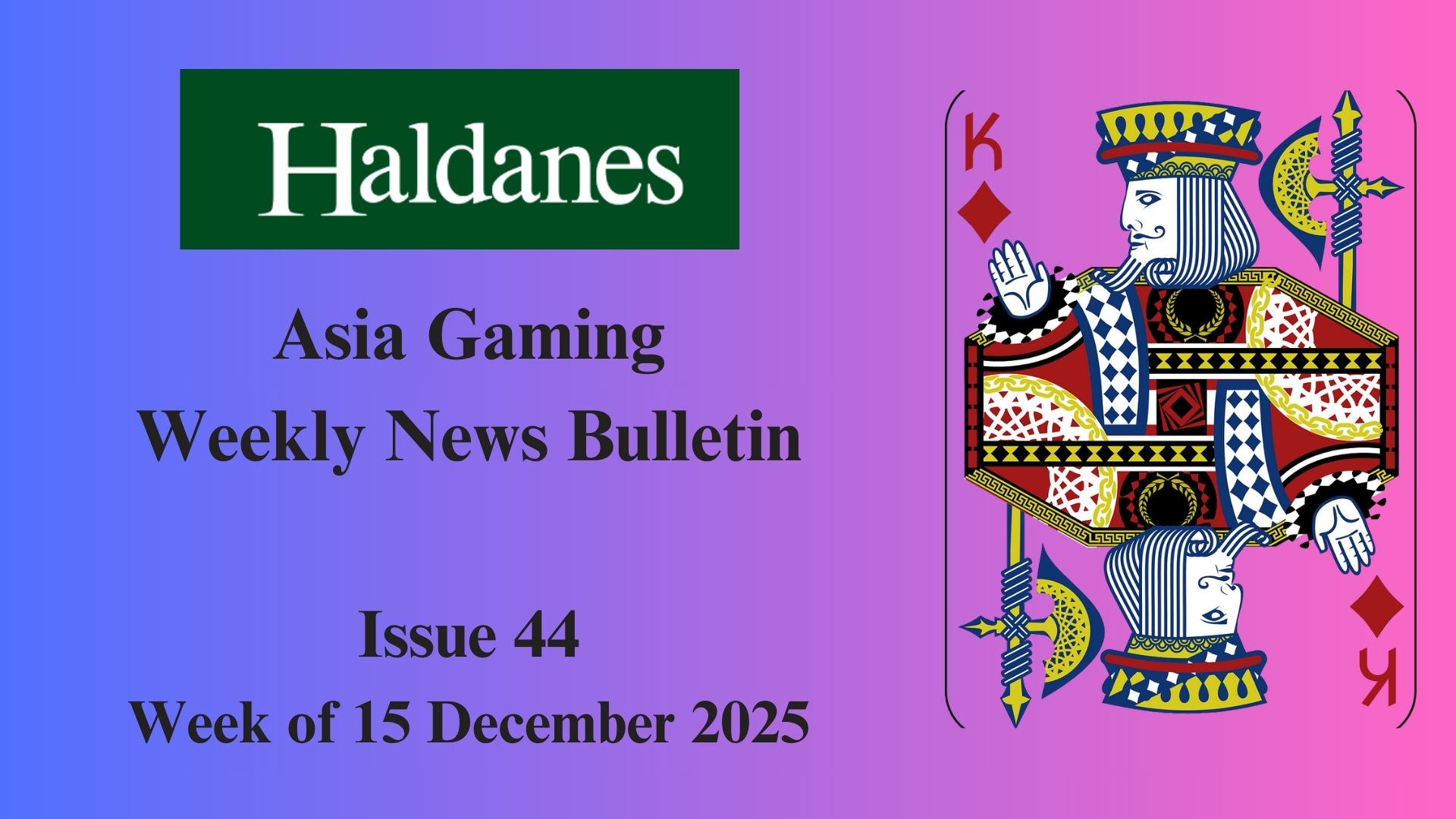Asia Gaming Weekly News Bulletin – ISSUE 30 Week of 1 September 2025
(1) Macau sets another post-pandemic record in August as GGR hits MOP$22.2 billion
Macau’s August GGR hit MOP$22.16B (US$2.76B), a new post-pandemic high (+12.2% YoY). Year-to-date revenue rose 7.2%, with analysts forecasting continued growth as operators boost shareholder dividends.
(2) Macau’s Galaxy Entertainment Group opens new office in Singapore
Galaxy Entertainment opens a Singapore office to attract Southeast Asian tourism/MICE business, supporting Macau’s push for international visitors and potential tax benefits. Follows Melco’s 2023 Singapore expansion.
(3) Over-regulation of legal betting risks fuelling Asia illegal gambling markets
Asian gambling regulators risk causing more harm than good if they tighten controls too far on licensed operators, as stricter rules are driving punters into unregulated markets dominated by organized crime, a new report warns.
(4) SPAC firm involved in failed Okada Manila merger and US listing placed into Chapter 11 bankruptcy by founder Jason Ader
Jason Ader’s SPAC, 26 Capital, files Chapter 11 bankruptcy amid $14M self-dealing claims and creditor lawsuits. A judge removed his control after the failed Okada Manila merger and Amex’s $370K card debt case.
(1) Macau sets another post-pandemic record in August as GGR hits MOP$22.2 billion

(Photo Credit: Inside Asian Gaming)
Macau’s gaming sector continues its upward trajectory, with the Gaming Inspection and Coordination Bureau (DICJ) reporting gross gaming revenue (GGR) of MOP$22.16 billion (US$2.76 billion) for August 2025. This marks a slight increase over July’s MOP$22.13 billion (US$2.73 billion) and represents a 12.2% year-on-year growth compared to August 2024. The latest figures set yet another post-pandemic record, reinforcing Macau’s recovery momentum.
For the first eight months of 2025, cumulative GGR reached MOP$163.1 billion (US$20.3 billion), reflecting a 7.2% increase over the same period last year. The sector’s resurgence, which gained significant traction starting in May, has prompted analysts to revise full-year forecasts upward, anticipating continued double-digit growth. JP Morgan highlighted August’s performance as the strongest non-Golden Week revenue since the pandemic, underscoring the market’s robust recovery.
Despite share prices lagging behind pre-pandemic levels, major concessionaires have demonstrated renewed financial health by issuing substantial dividend payouts to shareholders. This move signals strong cash flow and restored investor confidence in Macau’s gaming industry. Industry experts remain optimistic, projecting that Macau’s gaming sector will maintain its growth trajectory through the end of the year. The combination of resilient tourist demand, operator reinvestment, and improved economic conditions positions Macau for a strong finish to 2025.
News Source: https://asgam.com/2025/09/01/macau-sets-another-post-pandemic-record-in-august-as-ggr-hits-mop22-2-billion/
(2) Macau’s Galaxy Entertainment Group opens new office in Singapore

(Photo Credit: Inside Asian Gaming)
Macau’s Galaxy Entertainment Group (GEG) has opened a new Singapore office in the city’s central business district, targeting Southeast Asian tourism and MICE (Meetings, Incentives, Conferences, Exhibitions) business. The move aligns with the Macau SAR government’s push to diversify its visitor base beyond mainland China, Hong Kong, and Taiwan—a key requirement under the 2022 gaming concession re-tender.
GEG’s Singapore hub will curate bespoke travel experiences for regional travellers while promoting Macau’s tourism and MICE offerings. The initiative could also qualify GEG for a potential 5% GGR tax reduction, as Macau’s gaming law incentivizes revenue from international markets. The number of Singaporean visitors to Macau rose 2.9% YoY in July 2025, signalling growing interest.
GEG joins Melco Resorts, which opened a Singapore sales office in 2023, in expanding its regional footprint. This underscores Macau operators’ broader strategy to attract high-value international tourists amid evolving gaming regulations.
News Source: https://asgam.com/2025/09/02/macaus-galaxy-entertainment-group-opens-new-office-in-singapore/
(3) Over-regulation of legal betting risks fuelling Asia illegal gambling markets

(Photo Credit: Asia Gaming Brief)
Martin Purbrick’s report, From Regulation to Risk: Illegal Markets and the Inadvertent Growth of Gambling Harm by Over Regulation of Legal Markets, argues that excessive regulation of legal gambling markets inadvertently drives consumers toward illegal operators, increasing gambling-related harm. Since the COVID-19 pandemic, illegal gambling platforms have flourished by offering unrestricted betting options while licensed operators struggled with compliance burdens. These unregulated markets, which target vulnerable groups like minors and high-risk gamblers, operate without consumer protections or responsible gambling measures, exacerbating addiction risks.
The report highlights Asia as a key region where restrictive gambling laws have fuelled illegal markets. In countries like India, China, Indonesia, and Bangladesh—where most forms of gambling are banned or tightly controlled—billions flow into illicit betting platforms annually. High problem gambling rates (2.5–7.4%) far exceed global averages, with illegal operators exploiting regulatory gaps. For instance, Indonesia’s $20 billion underground market has prompted government crackdowns, while China’s state-run lottery fails to curb widespread illegal gambling.
Purbrick advocates for a balanced regulatory approach, distinguishing between high-risk products (e.g., online slots) and lower-risk activities like sports betting. The report cites evidence from Sweden and Australia showing that repetitive, fast-paced games cause more harm than skill-based wagering. Recommendations include tiered taxation, segregated betting accounts, and policies that keep legal markets competitive. Over-regulation, Purbrick warns, pushes bettors toward illegal platforms, undermining harm reduction efforts while depriving governments of tax revenue. The study urges regulators to prioritize evidence-based policies that curb addiction without stifling legal operators.
News Source: https://agbrief.com/intel/03/09/2025/over-regulation-of-legal-betting-risks-fueling-asia-illegal-gambling-markets-report/
(4) SPAC firm involved in failed Okada Manila merger and US listing placed into Chapter 11 bankruptcy by founder Jason Ader

(Photo Credit: Inside Asian Gaming)
Jason Ader’s special purpose acquisition company (SPAC), 26 Capital Acquisition Corp, has filed for Chapter 11 bankruptcy (July 11, 2025), revealing millions in unpaid debts to lawyers, accountants, PR firms, and tax authorities. The filing lists six-to-seven-figure claims, including a disputed $14 million owed to Ader’s own companies (26 Capital Holdings and SpringOwl Asset Management). The collapse follows the failed 2023 merger attempt with Philippines’ Okada Manila, which accused Ader’s firm of “material breaches and fraudulent conduct.” Ader claims he protected public shareholders by returning $275 million in trust proceeds, but a US bankruptcy judge stripped his control on August 22, appointing an independent trustee to oversee debt settlements.
The New York Post reports skepticism over Ader’s financial dealings, with a source alleging his companies provided no justifiable services for the billed amounts, calling it “gamesmanship and bad faith.” Separately, American Express is suing Ader for $370,000 in unpaid credit card charges, while his mother’s 2024 lawsuit over a $13 million family estate mortgage remains unresolved. These disputes compound scrutiny of Ader’s business practices post-SPAC downfall.
The bankruptcy caps a turbulent period for 26 Capital, which faced investor revolts and lawsuits from merger advisors after the Okada Manila deal imploded. Once a high-profile financier in gaming (formerly with Bear Stearns), Ader’s reputation now hinges on the bankruptcy court’s assessment of his financial transparency and creditor claims.
News Source: https://asgam.com/2025/09/03/spac-firm-involved-in-failed-okada-manila-merger-and-us-listing-placed-into-chapter-11-bankruptcy-by-founder-jason-ader/


